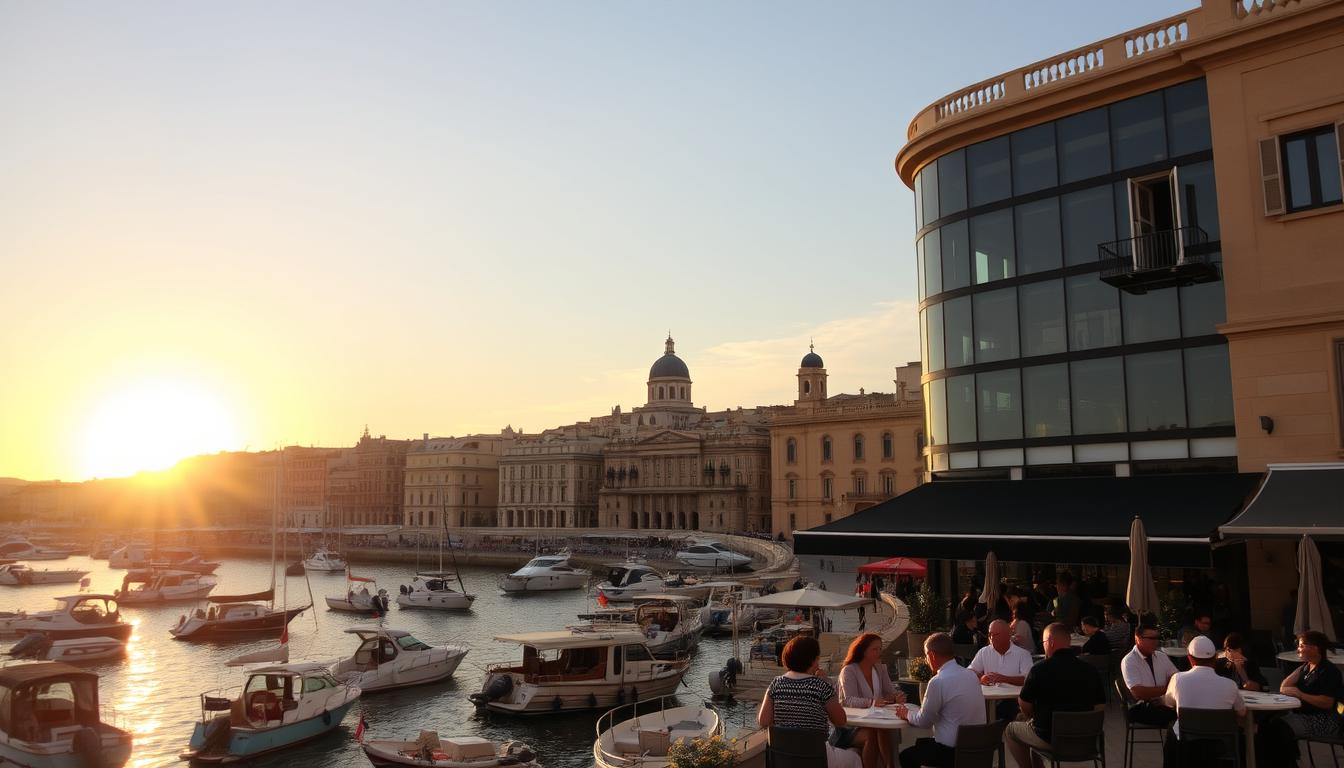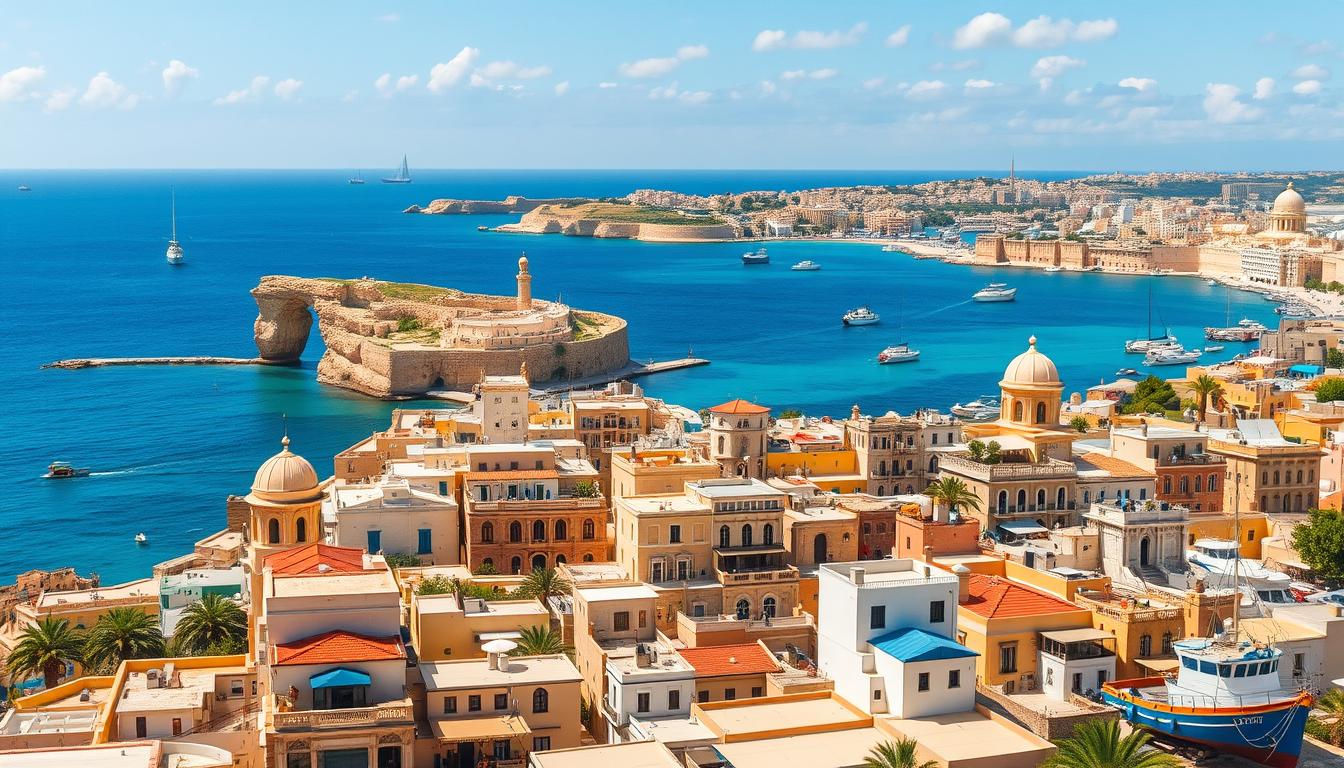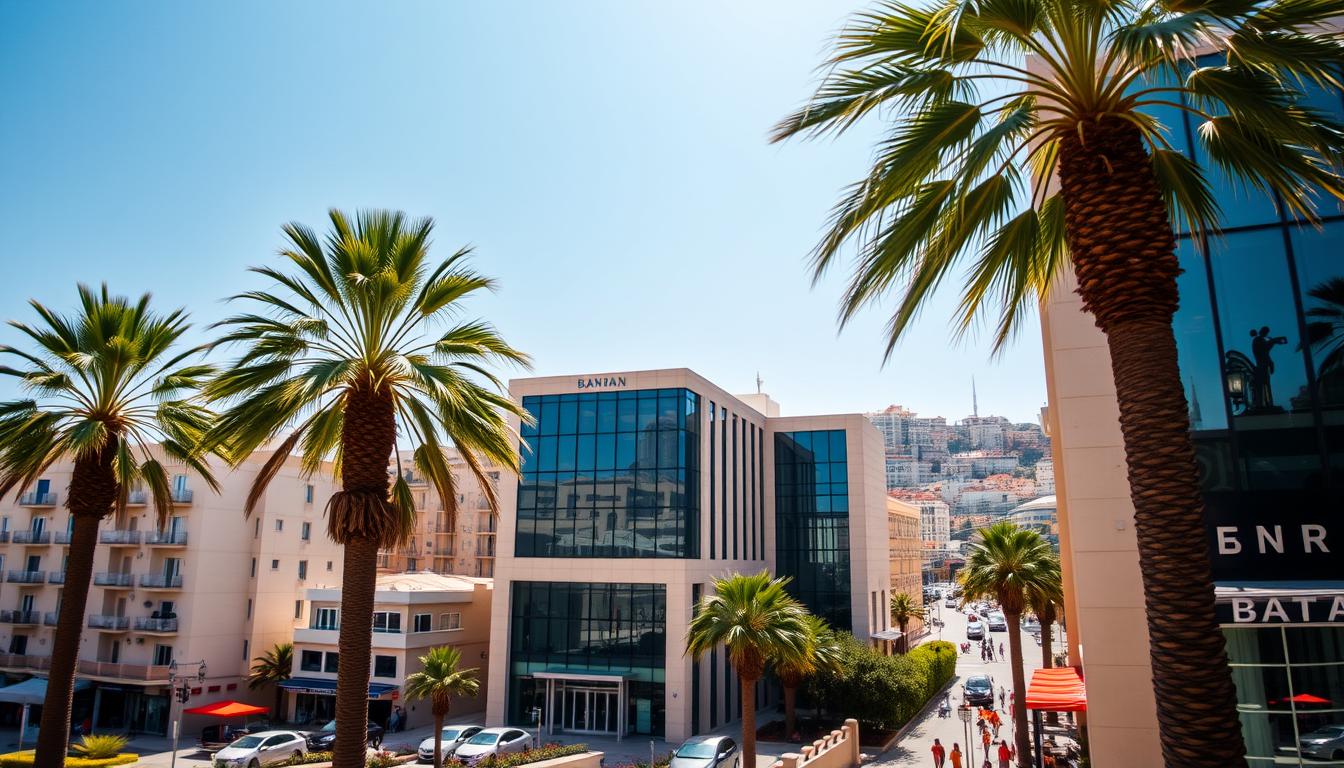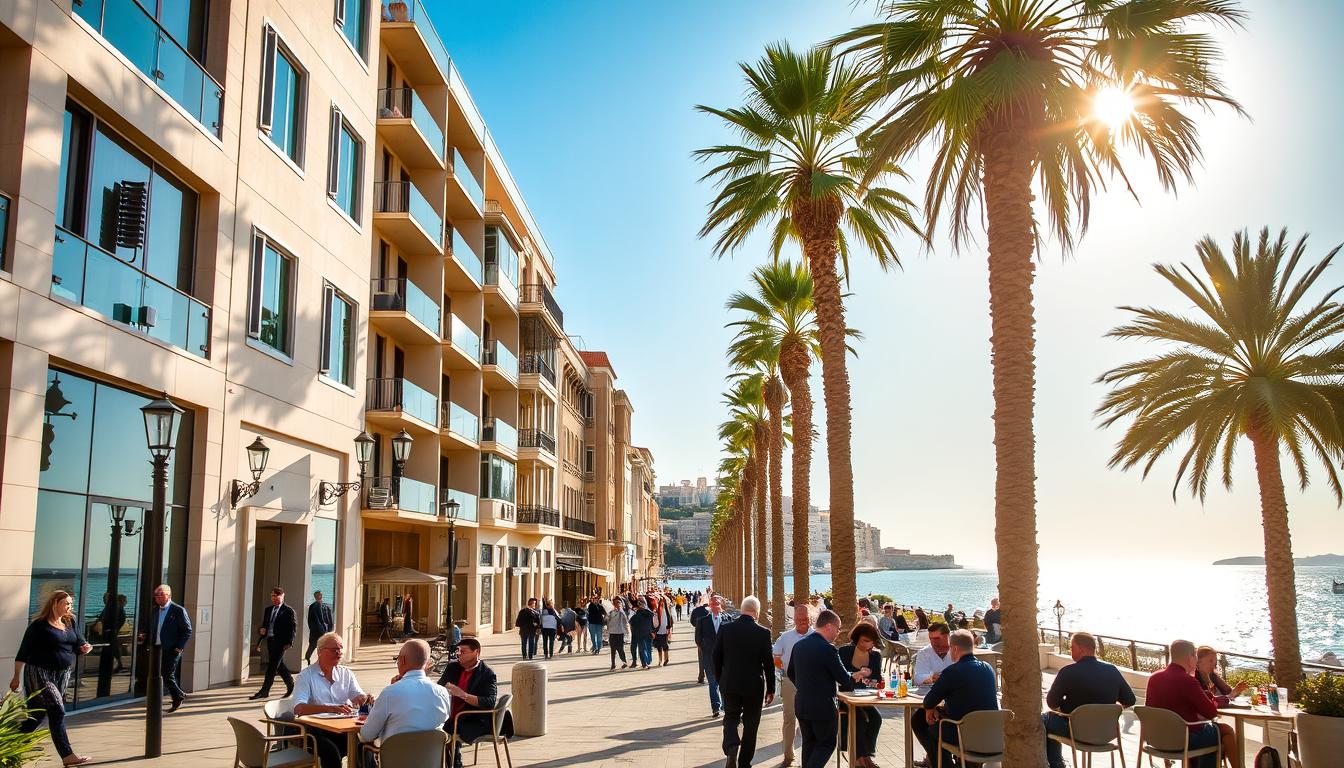Malta
Starting a business expansion journey is both thrilling and challenging. If you’re an entrepreneur looking to grow, Malta is a great choice. It has a good business environment, stable economy, and unique culture.
Our guide helps you understand why Malta is good for business. It’s in Europe, has a big economy, and is culturally rich. This guide gives you all the info you need to expand your business in Malta.
Malta is part of the Schengen Zone, giving access to 27 European countries and 450 million consumers. It also has business-friendly policies and tax benefits. Find out how Malta can help your business grow.
Why Malta is an Attractive Business Destination
Malta is a top choice for businesses looking to grow. It has a great location, stable economy, and supports businesses well. This makes Malta perfect for both big and small companies.
Strategic Location in Europe
Malta is right in the middle of the Mediterranean. This spot gives businesses easy access to markets in Europe, North Africa, and the Middle East. It’s great for reaching out to different customers and partners.
Stable Economy and Growth
Malta’s economy is strong and keeps growing. It’s ranked as the fourth best place for new startups in Europe. Over 300 startups have started in the last five years, adding over €1 billion to Malta’s GDP and creating 20,000 jobs.
The GDP per person is now over €44,000, showing Malta’s economic growth.
Business-Friendly Environment
Malta is very good for businesses, with lots of support and incentives. The government helps startups and established companies with funds and grants. For example, €2.5 million was given to 68 projects under the Business START scheme.
Malta also has a strong infrastructure, like good banking systems. The Malta International Airport (MLA) connects to over 100 destinations, handling over 7.8 million passengers in 2023.
Key Industries in Malta
Malta is known for its varied and lively economy, full of chances for investors. We’ll explore three main areas: financial services, technology and digital innovation, and tourism and hospitality.
Financial Services
The financial services sector is a big part of Malta’s economy. It benefits from strong rules and a skilled workforce. Malta’s spot in the European Union makes it a top choice for banking, insurance, and investment.
This sector is great for those wanting to invest in Malta. The country has good tax laws and deals with other countries.
Technology and Digital Innovation
Malta is becoming a key player in tech and digital innovation. It’s getting a lot of money for this sector, opening doors for entrepreneurs and big tech companies. The island is perfect for tech startups and digital nomads.
It has great government support, like the Digitalise Your SME Scheme. This helps Malta stay at the forefront of digital innovation.
Tourism and Hospitality
Tourism and hospitality are vital in Malta, thanks to its culture and beauty. The number of tourists has grown every year, showing the sector’s strength. This growth boosts the economy and offers many chances for investment.
Investors can use Malta’s beauty and history to draw in visitors and investors. This makes it a great place for real estate, hospitality, and cultural projects.
Steps to Establish a Business in Malta
Starting a business in Malta involves several steps. You need to pick the right structure and meet regulatory needs. Malta is known for its business-friendly environment and stable economy. Here, we’ll guide you through the key steps for setting up a company and getting the necessary licenses.
Choose Your Business Structure
The first step is to decide on your business structure. Malta offers several options like Limited Liability Companies (LLCs), Public Limited Companies (PLCs), Sole Proprietorships, and Partnerships.
- Limited Liability Company (LLC): Needs a minimum of €1,165 in share capital, with €233 paid up at registration. It must have at least 2 shareholders, 1 director, 1 Maltese secretary, and a registered office in Malta.
- Public Limited Company (PLC): Requires a minimum of €46,588 in share capital. It’s best for businesses looking to raise capital publicly.
- Sole Proprietorship: Great for individuals starting small businesses. It doesn’t need a minimum share capital.
- Partnerships: General and Limited partnerships also don’t need a minimum share capital. They’re flexible for joint ventures.
Register Your Business
Registering your business in Malta is quick, usually taking one to two weeks. You’ll need to reserve a business name, draft the company’s Memorandum and Articles of Association, and complete the registration forms.
If your business makes over €30,000 a year, you must register for VAT. This ensures you follow local rules and submit financial statements regularly.
Obtain Necessary Licences
Getting the right business licenses is essential for legal operation. The type of license needed depends on your business activities. For example, hospitality, construction, and food services have specific rules.
Malta makes getting licenses easy to avoid red tape. Companies might face inspections to check they follow the law. This helps ensure a safe and legal business environment.
For detailed advice on starting a business in Malta, including company registration and licensing, check our resources and expert services.
Understanding Malta’s Tax Benefits
Malta is a top choice for entrepreneurs because of its tax perks. The corporate tax rate can be as low as 5% thanks to special incentives and refunds. This makes it a great place for businesses to increase their profits.
Low Corporate Tax Rate
The official corporate tax rate in Malta is 35%. But, with the tax refund system, this can drop to just 5%. This makes Malta’s tax system very competitive in the European Union.
Double Taxation Treaties
Malta has over 70 double taxation treaties. These treaties help international businesses avoid being taxed twice on the same income. This makes it easier for them to operate across borders.
Tax Incentives for Foreign Investors
Malta has special tax incentives for foreign investors. These include tax credits for investments, R&D incentives, and low tax rates for sectors like iGaming. These tax policies make Malta a global business hotspot.
To learn more about Malta’s business-friendly environment, check out this resource.
The Role of Government Support
The Maltese Government is key in making the business environment friendly. Malta Enterprise leads in promoting foreign investment and helping businesses grow. It ensures firms get the support they need to succeed.
Malta Enterprise
Malta Enterprise supports both local and international businesses. It uses government incentives to help companies in Gozo, giving over €14 million in two years. It also plans to give €13 million through the Micro Invest scheme from 2023 to 2024.
This focused help makes Malta a top spot for innovation in the EU. Startups and growing businesses get the support they need.
Financial Grants and Support Schemes
The Maltese Government has many financial grants and schemes for businesses. Malta Enterprise offers the Gozo Transport Grant, giving €590,000 for better transport. It also gives €460,000 for other incentives like Business Start and Invest.
The InvestGozo platform helps gather data for better investment decisions. This shows Malta’s commitment to supporting businesses.
Malta works with Knowledge and Innovation Communities (KICs) in key areas like health and urban mobility. In 2022, €1.38 million was given for EIT grants to improve education and SME growth. This boosts the support Malta offers to businesses.
Malta invests in technology and entrepreneurship to stay ahead globally. It has strict rules for online gaming companies, creating jobs and increasing tax income.
To learn more about Malta’s appeal for UK companies, check out this blog. It offers more details on Malta’s business environment and the benefits for investors.
Networking Opportunities in Malta
Malta’s business scene is alive with many local and international networking chances. These are key for businesses wanting to grow. Getting involved in Malta’s business networking can help make valuable connections and find new business chances.
Local Business Associations
Local business groups are vital for building connections in Malta. Groups like the Malta Chamber of SMEs and Malta Employers’ Association host regular events. These events are great for sharing knowledge, finding new customers, and boosting your business’s image.
International Trade Events
Malta’s international trade events are a gateway to a global market. The Malta Trade Fair and Med-Tech World Summit draw people from all over. They’re perfect for businesses wanting to expand and compete globally.
Chamber of Commerce
The Malta Chamber of Commerce is a key player in business networking. It offers many chances for businesses to meet and learn through seminars and missions. This helps both new and established companies grow together, sharing knowledge and expertise.
Recruitment and Employment in Malta
Recruitment and employment in Malta follow strict local labour laws. These laws protect both employers and employees. It’s vital for businesses to know these rules to set up in Malta.
The Maltese labour market is known for its skilled and multilingual workforce. This makes Malta a great place for international companies. The Access to Employment Scheme (A2E) also helps jobseekers with challenges find work.
Understanding Labour Laws
Malta’s labour laws aim to balance the needs of workers and businesses. Employers must declare new employees on the same day they start. They also need to deduct FSS Tax and Social Security Contributions from wages.
These steps help prevent illegal employment. Non-EU nationals need an Employment Licence from Jobsplus to work in Malta. This shows the importance of knowing about Malta work permits.
Hiring Local Talent
Recruitment agencies in Malta are key for foreign businesses. They help fill jobs in various industries. Jobsplus’s Vacancy Profiling Unit (VPU) makes hiring easier by finding the right candidates.
After Malta joined the EU in 2004, more EU workers became available. This diversity enriches the talent pool for hiring in Malta. The Access to Employment (A2E) Scheme also helps people find jobs, increasing the workforce for businesses.
Navigating Work Permits
Non-EU nationals need to understand work permits. Jobsplus handles Employment Licence applications for them. This ensures businesses follow the law and avoid fines.
Knowing how to get Malta work permits makes hiring easier. Companies can use an Employer of Record like G-P. They can help with recruitment, onboarding, and keeping up with laws.
Overcoming Language Barriers
For businesses aiming to grow in Malta, tackling language barriers is key. English is an official language, making it easier for foreign companies to succeed. Yet, grasping local language subtleties can greatly boost success. Good business communication in Malta is vital for smooth operations and fitting into the local scene.
English as a Business Language
The English language’s widespread use in Malta makes business smoother. About 75% of global company employees say language barriers block clear communication. By using smart business communication Malta tactics, companies can avoid misunderstandings.
Investing in communication training can raise employee engagement by 20%. This shows how important speaking the language well is.
Importance of Local Knowledge
While English helps, knowing the local language is priceless. It stops misunderstandings, which can ruin up to 70% of international business talks. A study found 65% of professionals think knowing the culture makes them better communicators.
This means better talks, deeper cultural understanding, and success in business for companies.
Cultural Considerations for Businesses
It’s vital to understand Maltese business culture and local etiquette for success in Malta. Being culturally sensitive is key to building strong, lasting partnerships.
Understanding Maltese Business Etiquette
The business etiquette in Malta is unique, mixing Mediterranean warmth with professionalism. Being on time for meetings shows respect and dedication. It’s also important to use full titles in initial meetings.
While English is common, learning some Maltese can improve personal connections.
Building Relationships in Malta
Building personal relationships is central to Maltese business culture. Trust and respect come first, so things move slowly at first. Face-to-face meetings and social events are very important.
Don’t overlook the value of informal gatherings or business lunches. Local networking events are great for building these relationships.
By understanding these cultural aspects, you can lay a strong foundation for your business in Malta.
Challenges to Anticipate
Malta is a great place for business, but there are challenges to face. Knowing these can help you do well in Malta’s fast-paced world.
Bureaucratic Processes
Setting up a business in Malta is easier than in many places. Yet, it takes time and effort. It can take 30-60 days to register, which is slower than in some countries.
Getting permits and approvals can be slow. This can make things more expensive and frustrating. But, the government is working to make things faster.
Good management is key to avoid delays. This helps keep investment coming in.
Economic Fluctuations
Malta’s economy is strong, but it can change. These changes can affect businesses, more so in fast-growing sectors. The ‘Build and Share’ event showed how important good infrastructure is for growth.
Changes like higher costs and energy shifts will shape investments. Businesses must be quick to adapt to these changes.
Competition in Key Sectors
Malta’s main sectors like finance, gaming, and tourism are booming. But, they’re also very competitive. To stand out, businesses need to find their unique selling point.
The demand in these areas is high. This puts pressure on the infrastructure. Projects like Vjal Kulhadd aim to improve this. Businesses also need to keep up with new tech and what customers want.
Starting a business in Malta needs careful planning.
Success Stories of Companies in Malta
Malta is a hot spot for startups and innovation. It’s a place where businesses can really take off. The success stories of companies here are truly inspiring. They show us how to grow and thrive.
Case Studies of Established Businesses
Bureau Vallée is a shining example of success in Malta. It opened its first store in 2015. Today, it’s the top name in office supplies and stationery.
The company has four stores and over 12,000 B2B clients. Its online platform grows by 50% every year. This is thanks to weekly deals that draw in more customers.
Bureau Vallée’s success mirrors Malta’s business growth. The Qormi store was revamped last year. It’s now a flagship, showing the company’s dedication to innovation and customer happiness.
They also plan to update other stores and add new products. This shows their flexibility and focus on what customers want.
Lessons Learned
Bureau Vallée’s journey teaches us a lot. First, the right store locations and promotions can really help. Second, always keep things fresh with new ideas and store updates.
Lastly, offer products for all budgets. This attracts more customers and grows your market. These lessons from Malta’s successful businesses can guide new companies to success.
Future Trends and Opportunities
Malta is changing fast, and knowing the latest business trends is key for success. Renewable energy is a big area to watch. Malta wants to cut down on carbon and use energy better, making this field very promising.
Emerging Sectors
Malta is also seeing growth in fintech and digital arts. The fintech market is booming worldwide, and Malta is ready to join in. It has great rules for new fintech companies. Digital arts are also on the rise, thanks to new tech and more love for digital art.
The cybersecurity market is another area to watch. It’s set to grow by 25% by 2024. Starting jobs can pay between €20,000 and €30,000. Top jobs can earn up to €120,000 a year. Malta’s cybersecurity market is expected to make US$20.48 million in 2024, showing how important digital safety is.
Sustainable Business Practices
Businesses in Malta are focusing more on being green. Companies that go green can grow in many ways. They can get into sustainable tourism, renewable energy, and eco-friendly products.
There’s also a big chance for luxury green services and eco-friendly investments. More rich people want to live in Malta, thanks to its residency and citizenship programs. This makes Malta a great place for long-term investments.
Business owners and investors should keep up with these changes. Going green is good for the planet and for making money. Companies that focus on sustainability will lead Malta’s economy.
How We Can Help You Expand to Malta
At LerriHost, we offer a wide range of services to help you grow your business in Malta. Our team is full of experts who know how to deal with Maltese rules. They make sure your entry into the market is smooth and quick.
We know the challenges of the Maltese business world. We’re here to support you at every step.
Consultancy Services
Our consultancy services help you grasp the Maltese market and spot chances. We guide you on business expansion in Malta, from market analysis to financial planning. Our advice is key for starting a new business or growing an existing one.
Legal Assistance
Dealing with Malta’s legal system can be tough. But, our legal support in Malta makes sure you follow all rules. We take care of things like setting up your company and getting the right licences.
This lets you focus on growing your business. Our legal team knows both Maltese and EU laws well, giving you peace of mind.
Market Research and Insights
Knowing the market is vital for business growth. We offer deep market research and insights tailored for you. Our analysis covers consumer habits, competition, and new trends.
This ensures your business plans are based on solid data. With over 20 years of market experience, we help you dive into Malta’s lively economy. We guide you in making smart choices.

Pros and Cons of Expanding Your Business to Malta
Explore the pros and cons of expanding your business to Malta to make an informed decision about your international growth strategy.

Structural business statistics in Malta
Malta’s economy is complex, and Structural Business Statistics (SBS) help us understand it better. These statistics are key to seeing ...

Starting a Business in Malta: Branch or Subsidiary?
When starting a business in Malta, one major choice stands before us. Should we go for a branch or a ...

Relocating to Malta for business
Explore the benefits of relocating to Malta for business, from company formation to tax advantages and residency options.

Top Business Ideas to Start in Malta – Explore Now
Uncover the top business ideas to start in Malta and tap into unique opportunities in a thriving Mediterranean hub. Initiate your success journey.

Understanding Business Banking in Malta
Explore the nuances of Business Banking in Malta with our comprehensive guide to services, regulations, and benefits for UK companies.

Understanding Business Culture in Malta
Explore the essentials of business culture in Malta with our in-depth guide, designed for UK professionals seeking to navigate the Maltese corporate world.

Doing Business in Malta: Your Guide to Success
Embark on your commercial venture with ease. Our guide simplifies doing business in Malta, spotlighting key strategies for market success.
Are you planning to Start a business in Malta? Is it better a Branch or Subsidiary for Malta?
